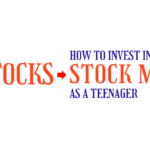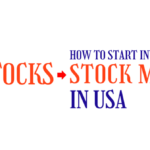Financial investments come with the potential to generate additional income, fund a relaxing retirement, or even remedy a stressful financial situation. Regardless of age or income level, you can start accumulating wealth management through the investments described in the following sections.
Quick Insights
What is the best investment right now in USA?
What are the best investments for beginners? Investment is a path to generate your future income. The important factor is to choose the best investments according to your individual circumstances, risk management ability, and current income.
Below are the top 10 investment options to consider. These also involve a degree of risk. Remember that less risk typically corresponds to lower rewards.
Stocks
Individual stocks: When purchasing individual stocks with a brokerage account, there is a decrease in fees compared to investing in funds. You are exempt from paying the fund company an annual management fee for managing your investments.
Instead, you incur a fee upon purchasing and another when selling the stock, with no extra costs in between. Due to the unstable nature of individual stocks, investors should cap their holdings in single stocks at 10% or below their overall investment portfolio.
Dividend stocks: Stocks that pay dividends are investments in companies that regularly distribute a percentage of profits to shareholders. The typical dividend yield for leading dividend-paying stocks is around 12.69%.
Dividend stocks provide steady income streams and can stabilize returns during volatile markets. Since they often come from large, well-established companies, dividend stocks have also benefited from the rally in large-cap stocks.
Small-cap stock: Small-cap funds focus on investing in companies ranked below the top 250 stocks based on their market capitalization.
These smaller companies typically exhibit promising growth potential, with many eventually growing into market leaders despite their initial small size, offering investors the possibility of substantial returns.
Large-cap stock: Large-cap funds are a type of equity funds that place a significant portion of their assets under management into the stock shares of corporations that have a high total market value.
Value stock: A value stock is characterized by a lower price than its actual worth due to possessing attributes that typically warrant a much higher price. It is an investment pool that employs a strategy centered on undervalued shares determined by fundamental analysis.
Growth stock: Growth stocks are characterized by fast-paced growth in both sales and profits. While growth stocks offer the possibility of higher returns, they also come with more risk compared to other investment vehicles like bonds, mutual funds, and CDs.
That said growth stocks have the potential to generate substantial long-term gains, particularly for companies with solid business models and cutting-edge offerings.
Bonds
Long-term and short-term bonds: Investors can experience peace of mind by holding short-term bonds until maturity since they are less susceptible to fluctuations in bond prices caused by interest rate changes.
In contrast, long-term bonds have a higher duration, indicating that their prices are more sensitive to interest rate variations. Duration is a measure of a bond’s responsiveness to shifts in interest rates.
Government bonds & corporate bonds: Governments and corporations choose to issue bonds to protect funds. When you buy a bond, you make a loan to the issuer. In return, they usually promise to repay the principal amount of the loan on a predetermined date, apart from paying you interest twice a year.
Money market account
The money market accounts are a segment of the financial market where highly liquid financial instruments with short-term maturities are bought and sold. These include cash, cash equivalents, and debt securities with high credit ratings and short-term maturities, such as U.S. Treasury bills.
It allows participants to access short-term funding and investments while providing a source of liquidity for the economy. Trading instruments with short maturities enables efficient transfer of capital between parties who need short-term funds and those with excess liquidity.
Certificate of deposit
A certificate of deposit, commonly known as a CD, is a financial product provided by financial institutions like banks and credit unions. When you open a CD, you commit to leaving your funds deposited for a predetermined period, refraining from making any early withdrawals.
Certificates of Deposit terms usually range from one to five years. So if your goal is to grow your money safely to meet a specific financial target within a set time horizon, CDs may be a suitable choice. Should you need to access your money before the agreed-upon time frame, you will incur a penalty fee enforced by the bank.
High-yield savings account
An online savings account with a high return grants you interest based on the amount of money you have available. High-yield savings accounts provide a greater interest rate compared to conventional savings accounts. The interest rate associated with these accounts is commonly referred to as APY or annual percentage yield.
Mutual fund
A collective investment vehicle known as a mutual fund gathers funds from numerous investors and allocates them to different securities, such as stocks, bonds, and short-term debt, to mitigate the risk of loss on any single investment.
If you’re aiming to save for a long-term objective or retirement, mutual funds offer a convenient path to acquire the most favorable investment returns from the stock market without acquiring a portfolio of individual stocks.
Index fund
S&P 500: S&P 500 index funds allow investors to invest in the Standard & Poor’s 500 Index, a group of stocks comprising the U.S.’s biggest and most profitable corporations. Over the long run, the S&P 500 index has generated an average return of roughly 10% per year, making it an appealing investment choice.
The index is weighted by market capitalization, meaning the companies with the highest market values have the greatest impact on the index’s performance. An index fund is a diversified investment like a mutual fund.
Nasdaq-100: The Nasdaq Stock Market, formerly known as the National Association of Securities Dealers Automated Quotations, is a stock exchange located in New York City.
The Nasdaq 100 index tracks the 100 largest non-financial companies listed on the Nasdaq exchange based on market capitalization. As such, the Nasdaq 100 comprises some of the most prosperous and steadfast companies traded on the exchange. It is similar to a mutual fund.
Exchange-traded fund
ETFs, or exchange-traded funds, are investment vehicles that are traded on stock exchanges and typically track a specific market index. Investing in an ETF provides investors with a basket of assets that can be bought and sold during regular trading hours.
This can help reduce risk through diversification, as ETFs contain a variety of holdings rather than just a single stock or bond. The diversified nature of ETFs may also limit exposure to volatility in specific markets. Overall, ETFs offer investors a convenient way to gain broad exposure and diversify their portfolios.
REIT fund
Real estate investment trusts, commonly known as REITs, are enterprises that possess or provide funding for real estate properties that generate income in various sectors. Opting to invest in REITs is an excellent strategy to broaden your investment types beyond conventional stocks and bonds.
This choice can be appealing due to the substantial dividends they offer and the potential for long-term appreciation of capital. Following a challenging period characterized by increasing interest rates, it is plausible that REITs might experience resurgence in 2024.
Cryptocurrencies
Virtual currencies known as cryptocurrencies operate on blockchain technology, facilitating direct transactions between users without the need for a central banking authority. Similar to traditional currencies, cryptocurrencies can be utilized for purchasing various goods and services.
Among the numerous cryptocurrencies available, Bitcoin and Ethereum stand out as widely recognized options in this digital financial landscape. One potential advantage of cryptocurrency is its ability to generate higher returns than traditional stock market investments.
For instance, during the period concluding in February 2024, Bitcoin experienced an 88.87% return, whereas the S&P 500 only saw a 20.51% return.
What is the best return on investment in USA?
A positive return on investment is usually deemed favorable, with a typical ROI of 5-7% frequently viewed as a reasonable goal. However, a robust general ROI exceeds 10%. On average, an ROI of 7% adjusted for inflation is regularly considered sound, according to the historical performance market.
The typical annual gain in the United States stock market, after accounting for inflation, has been 10% per year since the late 1920s.
Through the years, the US stock market has been considered to provide the best returns on investments. But there is more risk in the stock market. However, higher risk creates higher returns. Generally, stock prices are more volatile than bond prices.
How to choose the best investments in 2024
Based on timeline
This level varies depending on the needs of the investor. If you need to invest with a small period like an emergency fund then you can approach short-term investment. If you have more time-consuming situations or don’t need the money right now, you can approach long-term investing.
Based on risk tolerance
If you can bear the high risks of a volatile stock market, you can opt for short-term investments and earn higher returns. At the same time, long-term investment is suitable for you if you cannot bear the risk tolerance or expect average returns.
Based on investor knowledge
Being fully aware of the investment while investing will increase your returns. When investing in savings accounts, CDs, etc., it works with FDIC protection so no thorough knowledge is required. However investing in stocks, bonds, cryptocurrency, and mutual fund investment requires more knowledge.
Based on the investment amount
The greater the amount of money you have available to put into investments, the more it makes sense to look into riskier options that could provide bigger returns.
When you have a larger investment budget, it can be worth taking the time to thoroughly research particular stocks or sectors that are more complex but may yield higher profits.
Conclusion
Investing can be a great way to stretch your money. Invest well knowing the list of the best investments of this year 2024. Investment options vary depending on the nature of the investor such as income, objective, preference, and risks.
It’s easy to start investing with a brokerage account. And there are many ways for you to trade them. So choose the right investment that suits you and trade towards your goal regardless of the minimum loss.
Pro Tip
Improving your trading performance is even more important. With the help of our trusted forex brokers, you can keep up-to-date with various investment options including CFDs, forex, stock, mutual funds, and cryptocurrencies.
FAQs – Frequently Asked Question
1. What is the best way to invest money right now?
Government bonds are debt securities that provide a steady flow of payments, which is why they are classified as fixed-income investments. Since the principal and interest payments on government bonds are guaranteed by the federal government, they are essentially risk-free assets for investors.
2. Is it good to invest money right now?
The current market climate provides a good opportunity to invest for the long term, whether your goals are 5, 10, or 40 years away. Although there are concerns about a potential recession, keep in mind that stock prices reflect future anticipated profits.
So even in uncertain times, investing today allows you to potentially benefit from the market’s future growth. The key is focusing on the long view rather than short-term volatility.
3. Can I double my investment in 5 years?
Yes, mutual funds that are invested for the long term can generate annual returns of 12% to 15%. With that rate of compound growth, an investment in these mutual funds could potentially double in value within 5 to 6 years.
4. How do individual investors access investment?
- Individual investors have the option to manage their personal finance by opening a brokerage account.
- For those uncertain about the most suitable investments for their needs, there are affordable automated advisory services called robo-advisors that can construct an investment portfolio on their behalf.
- Some short-term investment vehicles such as savings accounts are also available directly through banks.
5. How to calculate ROI?
ROI = (End value of investment – Initial value of investment) / Initial value of investment.
For example: If you are investing the stock amount of $ 1000 and you sold the stock value of $ 1500 after a few years. To calculate ROI using the given formula:
ROI = ($1500 – $1000) / $1000 for an ROI of $500 / $1000 or 50%.
6. How to increase ROI?
- Generally, if you increase your business revenue, it will automatically increase and improve your ROI.
- Using and realizing the market’s existing data like surveys, social listening, and customer feedback
- Following a cost-cutting method will improve your ROI.




